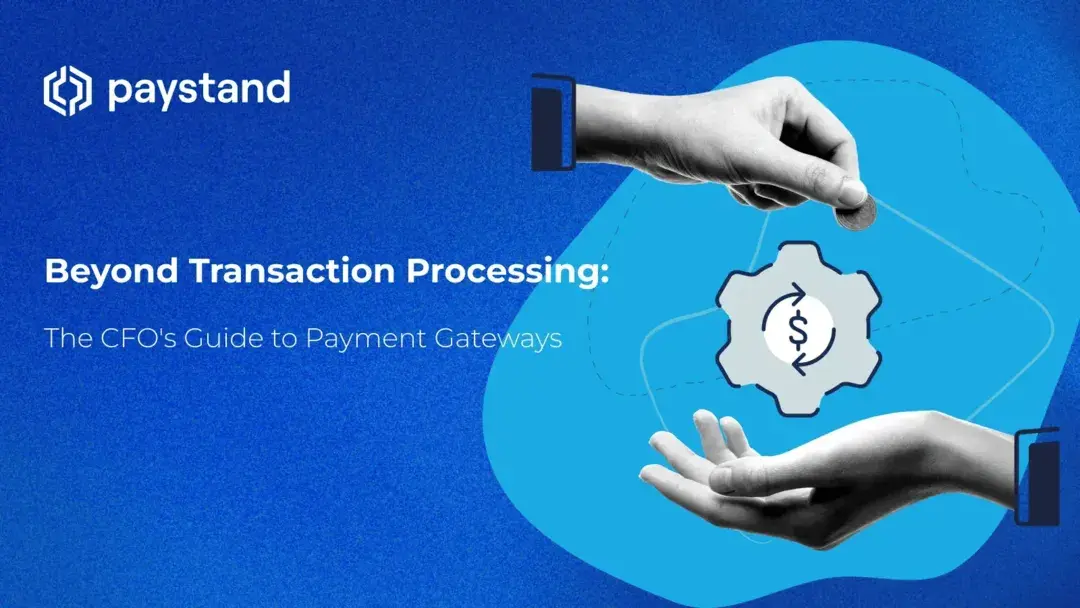Beyond Transaction Processing: The CFO's Guide to Payment Gateways

Key Takeaways:
- A payment gateway is a service that securely processes credit and debit card transactions for online and in-store businesses.
- There are four main types of payment gateways: redirect, hosted, self-hosted, and API-hosted. Each serves a different business need.
- Payment gateways are distinct from payment processors. Gateways handle customer-facing transactions, while processors manage backend fund transfers.
- When choosing a payment gateway, you should evaluate security features, integration capabilities, transaction fees, and geographic coverage.
U.S. retail e-commerce sales hit $289.2 billion in Q1 2024, a 2.1% rise from the previous quarter. This surge highlights the growing reliance on digital transactions and the central role of payment gateways in business operations.
Understanding and leveraging payment gateways is no longer optional for CFOs. It’s a strategic imperative to optimize revenue, reduce risks, and future-proof operations.
Let's dive into everything you need to know about payment gateways, from their fundamental operations to strategic implementation considerations.
What is a payment gateway?
A payment gateway is the underlying technology that helps businesses securely accept credit card and digital payments, whether online or in person.
Think of it as a digital version of a physical point-of-sale terminal—it captures payment information, ensures security, and facilitates communication between your customer's bank and yours.
The importance of payment gateways
Payment gateways are your first line of defense against fraud and a key driver of business continuity. When a gateway processes a transaction, it encrypts sensitive card data, validates the customer's information, and ensures funds are available—all in milliseconds.
Gateway downtime can be catastrophic for enterprise businesses. Even a few minutes of interruption can mean thousands in lost revenue and damaged customer relationships. This is why many companies, especially those with high-volume operations, implement multiple payment gateways.
A multi-gateway strategy provides redundancy and ensures business continuity if one gateway experiences issues.
Multiple gateways also offer strategic advantages. They allow you to:
- Route transactions through the most cost-effective gateway based on card type
- Maintain operations if one gateway has technical issues
- Optimize approval rates by using different gateways for different regions
- Reduce processing costs by leveraging competitive pricing
Common use cases for payment gateways span industries and business models. Take BIIA Insurance, an insurance pioneer in Virginia. Like many businesses, BIAA faced challenges such as manual billing processes, high credit card fees, and inefficient payment collection.
Here was the impact of a digital payment gateway:
- 65% improvement in back-office efficiency
- 42% increase in digital payment adoption
- 50% decrease in transaction costs
Whether you're in e-commerce processing customer orders, retail managing in-store and online payments, or B2B handling large-scale transactions, payment gateways serve as the backbone of modern payment operations.
For CFOs, this means reduced chargebacks, lower fraud rates, and better financial predictability.

Four types of payment gateways
1. Redirect payment gateways: Customers can pay on a third-party site (like PayPal) before returning to yours. This is ideal for small businesses and startups that need quick implementation with minimal security overhead and don't mind sacrificing some user experience control.
2. Hosted payment gateways: Payment form embeds directly into your checkout page while the provider handles processing. Perfect for mid-sized businesses that want to maintain brand consistency while avoiding PCI compliance burden.
3. Self-hosted payment gateways: Your business handles the entire payment process on your servers. These are best for large enterprises and regulated industries that need complete control over payment data and can manage full PCI compliance.
4. API-hosted payment gateways: They integrate payment processing directly into your existing business software through modern APIs. They are ideal for tech-forward companies that want a seamless user experience and the security of third-party processing.
Payment gateway vs payment processor - Key differences
| Feature | Payment Gateway | Payment Processor |
| Primary Function | Captures and encrypts customer payment data from your website or POS. | Handles communication between banks and moves money between accounts. |
| Customer Interaction | Frontend - Interfaces directly with customers through checkout forms. | Backend - No direct customer interaction. |
| Point of Entry |
First stop in the payment journey - validates and secures card data. | Second step - receives encrypted data from the gateway. |
| Security Role | Handles sensitive card data encryption and initial fraud checks. | Focuses on bank-level security and fund transfer verification. |
| Business Relationship | Contracts directly with the merchant | Often works through acquiring banks. |
| Typical Examples | PayPal, Stripe, Paystand | First Data, TSYS, Chase Merchant Services |
| Cost Structure | Per-transaction fees, monthly fees, setup costs. | Usually bundled with merchant account fees. |
Note: Many modern providers, like Paystand, offer gateway and processing services, streamlining businesses' payment stacks.
How do payment gateways work?
Understanding the mechanics of payment gateways is crucial, not just for technical oversight but also for making strategic decisions about payment operations.
Think of a payment gateway as an orchestra conductor, coordinating multiple players in a carefully timed sequence that takes seconds to complete. Here's how a transaction flows through a payment gateway.
Transaction flow explained
1. Payment initiation: The customer enters card information, and the gateway immediately encrypts and validates the data before proceeding. This process takes less than a second.
2. Authentication and authorization: The encrypted data travels to the customer's bank to verify funds and security measures, returning an instant approval or decline. This is where most transaction failures occur.
3. Capture and settlement: At the end of each day, approved transactions are recorded and processed in batches, moving funds from customer accounts to your merchant account. While authorization is instant, settlement typically takes 24-48 hours.
Security features and compliance
Modern payment gateways are your front-line defense against payment fraud and data breaches. They employ tokenization, which replaces sensitive card data with unique identification symbols.
Even if financial data is compromised, it's useless to fraudsters. This feature alone can prevent massive fraud attempts for enterprises processing thousands of recurring payments.
The rise of AI-powered fraud detection has changed how gateways protect transactions. These systems analyze patterns in real-time, learning from each transaction to better identify suspicious activities:
- Unusual spending patterns
- Mismatched shipping and billing addresses
- Multiple failed transaction attempts
- Geographic anomalies
Payment gateways offer tailored solutions for industry-specific compliance. Healthcare providers need HIPAA-compliant payment processing to protect patient data.
Travel companies require enhanced authentication for international transactions. Retail operations must maintain PCI DSS compliance for high-volume processing, and B2B companies often need additional verification layers for large-value transactions.
Authentication methods have also evolved beyond simple password protection:
- Two-factor authentication safeguards high-risk transactions
- Address Verification Service (AVS) matches billing addresses
- Card security codes help prevent card-not-present fraud
- Biometric verification adds an extra layer for mobile payments
The math is simple---fraud prevention costs pale compared to chargeback expenses ($20-$100 per incident). Investing in robust security features isn't just about protection—it's about maintaining healthy profit margins and customer trust.
Which payment gateway is best for your business?
While payment gateway features and pricing are important, the right choice depends on your specific business model, growth trajectory, and risk tolerance.
Let's examine the key factors that should drive your decision:
Key factors to consider
Start by evaluating these critical areas:
1. Business Operations
- Transaction volume: Monthly processing volume affects pricing tiers and feature access. Higher volumes often qualify for better rates and premium features.
- Payment methods: Consider which payment types your customers prefer. Some industries need ACH and wire transfers, while others focus on credit cards and digital wallets.
- Geographic reach: International businesses need gateways that support multiple currencies and comply with regional regulations.
2. Technical Requirements
Integration capabilities: Your gateway should work seamlessly with your existing:
- Accounting software
- ERP systems
- Customer relationship management tools
- E-commerce platforms
Security and compliance
When evaluating gateway security, consider these essential elements:
1. Fraud Prevention Infrastructure
- Real-time fraud screening tools
- IP address monitoring
- Velocity checks
- Machine learning algorithms for pattern detection
2. Compliance Requirements based on your industry, like:
Financial services
- PCI DSS Level 1 compliance
- SOC 2 Type II certification
- Regular security audits
Healthcare
- HIPAA compliance for patient data
- Secure payment data storage
- Audit trail capabilities
Retail and E-commerce
- 3D Secure 2.0 support
- Strong Customer Authentication (SCA)
- EMV compliance for in-person payments
Cost structure analysis
A comprehensive cost analysis should consider both direct and hidden expenses that impact your bottom line.
Direct Costs Most gateways charge a combination of:
- Transaction fees (typically 2.5-3% + $0.30 per transaction)
- Monthly or annual subscription fees
- Setup and integration costs
However, the true cost of a payment gateway includes operational factors. For instance, a cheaper gateway that requires more manual intervention or causes frequent payment failures could cost more in the long run through:
- Lost sales from declined transactions
- Staff time spent on payment reconciliation
- Customer service resources handling payment issues
- Integration and maintenance costs

Modernize your payment gateway with Paystand
Your payment gateway should do more than process transactions—it should drive business value. Paystand is a departure from traditional payment gateways, combining blockchain technology with cloud-based automation to transform B2B payments.
While traditional payment gateways charge 2.5-3% per transaction, directly impacting your margins, Paystand offers a zero-fee payment rail in addition to credit card, ACH, and eCheck processing. Backed by powerful blockchain technology, Paystand also features:
- Direct ERP connections with NetSuite, Sage Intacct, and Dynamics 365
- Smart invoicing with embedded payment links
- Automated reconciliation and real-time fund verification
- Immutable audit trails for every transaction
- Real-time payment verification
- Enhanced fraud prevention through distributed ledger technology
- Fast and easy setup
Get started with Paystand today and modernize your payment operations.






